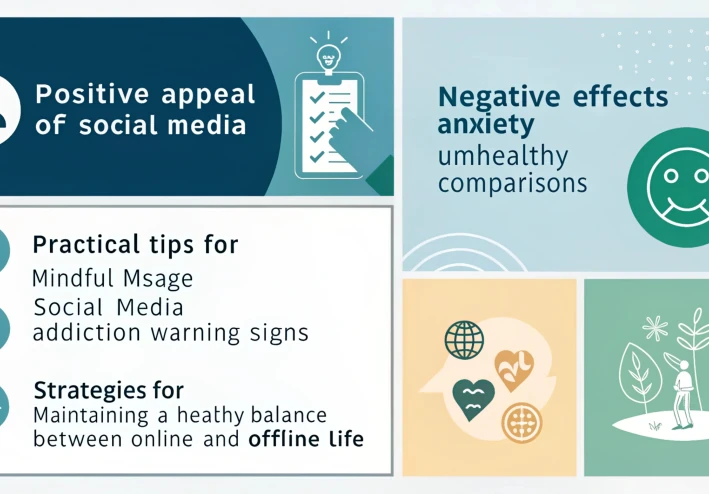
The Impact of Social Media on Mental Well-Being: Finding a Healthy Digital Balance
The Impact of Social Media on Mental Well-Being: Finding a Healthy Digital Balance
In today’s era of advanced technology and instant communication, the online world and social media platforms form a dynamic landscape that is constantly evolving. This digital environment serves as a modern stage for interaction and engagement — but what is the price we pay when it comes to our mental well-being? It is essential to explore the deep and complex effects of digital integration on our daily lives.
The Appeal of Social Media
Social media has become an indispensable part of our everyday routines. These platforms provide an interactive space that connects people, allowing them to share thoughts, ideas, and personal experiences. On the positive side, social media fosters virtual relationships, encourages self-expression, and builds communities around shared interests.
However, it is crucial to be mindful of the strong pull of this digital world. The performative nature of online content can lead to anxiety and unhealthy comparisons. The challenge lies in navigating the positive aspects of social media without losing emotional balance.
The Effects of Social Media on Mental Well-Being
Social media is a blend of bright highlights and hidden shadows. Constant interaction with updates, stories, and posts can create a sense of connection and belonging, which may help reduce feelings of loneliness.
On the flip side, the curated and often idealized nature of online content can spark negative emotions. Comparing our own lives to the seemingly perfect lives of others can trigger stress, anxiety, and diminished self-esteem. The psychological pressure created by this constant comparison can leave lasting effects on mental health.
Social Media Addiction
Another growing concern is social media addiction. The constant pursuit of likes, comments, and validation can lead to feelings of inadequacy and lower self-worth. Over time, the need for digital approval can become a compulsive habit, heightening stress levels and anxiety.
As this dependency deepens, people may struggle to disconnect, sacrificing real-world interactions, rest, and productivity in exchange for online engagement.
Challenges of Navigating the Digital World
Living in a hyper-connected world raises questions about how we can control our engagement with social media in a way that benefits our mental well-being. The ability to separate digital reality from physical reality has become essential for maintaining a healthy balance.
Warning Signs of Excessive Use
When social media shifts from being a tool for connection to a controlling force in someone’s life, warning signs begin to appear. These may include:
Spending excessively long hours scrolling and checking updates.
Neglecting daily responsibilities and personal relationships.
Feeling anxious, restless, or low when unable to access social media.
Recognizing these red flags is the first step toward restoring balance.
Balancing the Real and Digital Worlds
To achieve a healthy balance, it is necessary to manage time between real-world experiences and digital interactions. We can enjoy the benefits of social media without becoming consumed by it.
Practical strategies include setting specific time limits for social media use, scheduling screen-free periods, and intentionally focusing on offline activities that nurture personal growth and well-being.
Understanding the Deeper Impact
To avoid the hidden pitfalls of excessive social media use, we need a deeper understanding of its psychological and social effects. Reading scientific research, engaging in mental health discussions, and reflecting on personal digital habits can all help in making conscious choices about online behavior.
Taking a Break for Renewal
Sometimes, a complete break from social media is necessary for mental clarity. A digital detox can serve as a reset — allowing individuals to refocus on personal goals, strengthen in-person relationships, and reclaim a sense of control over their time and attention.
Using Social Media Mindfully
Ultimately, mindful social media use is the key to reaping its benefits while minimizing harm. Positive engagement — such as interacting with uplifting content and participating in meaningful conversations — can have a lasting positive effect on mental well-being.
Practical Tips for a Healthy Digital Relationship
Set Time Boundaries – Define clear time slots for using social media to prevent it from dominating your daily life.
Curate Your Feed – Unfollow accounts that trigger negative emotions and choose content that inspires and motivates you.
Practice Conscious Consumption – Pay attention to your feelings while browsing, and take breaks when you notice stress or fatigue.
Prioritize Real-Life Connections – Invest time in personal relationships and face-to-face interactions outside the digital sphere.
Conclusion
Our relationship with social media must be built on balance. These platforms can be a source of positive connection and mental enrichment when used consciously. By setting boundaries, understanding our triggers, and prioritizing offline life, we can create a healthier, more fulfilling digital experience.




































